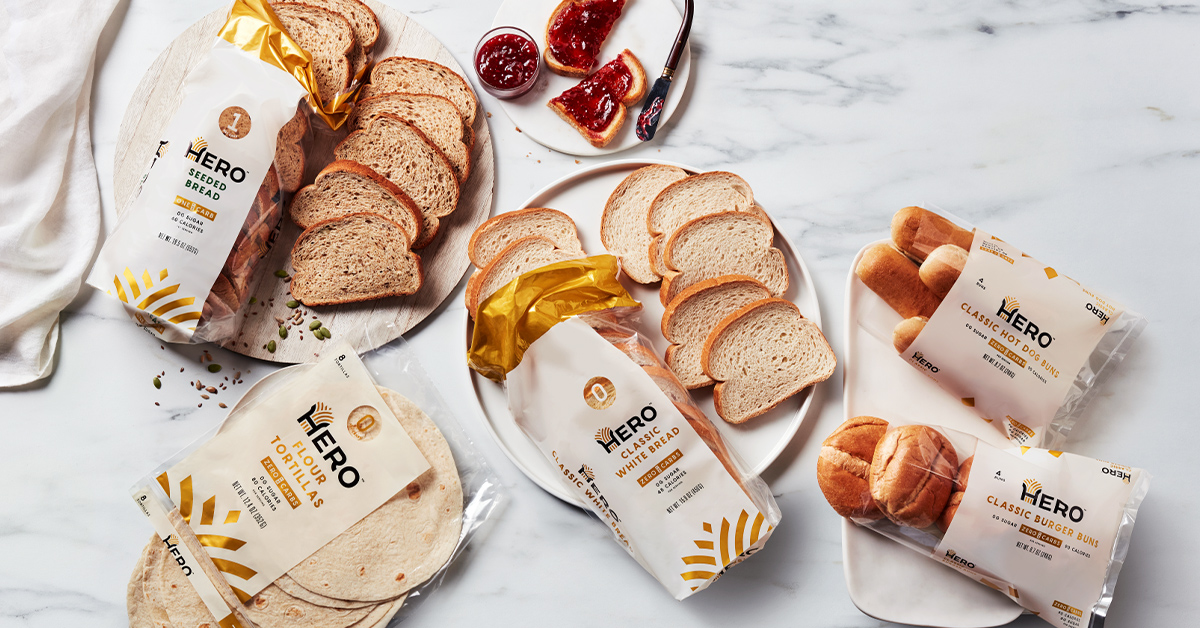On the Rise: Hero Bread Closes $15M to Grow National Distribution

Bakery brand Hero Bread announced today it has closed $15 million in funding to help the brand meet consumer demand and fuel future product innovation. The capital raise comes as the San Francisco-based brand shifts its focus to physical retail.
The newest funding round included participation from new and existing investors including Cleveland Avenue, DNS Capital, Union Grove Venture Partners, GreatPoint Ventures and 444 Capital (The D’Amelio Family Fund). To date, Hero has raised $47.5 million, most recently raising just over $30 million in late 2021.
“444 Capital is joining Hero Bread and fellow like-minded investors to revolutionize the baking category and help people on their journey to lead healthier lives,” said Heidi D’Amelio, mother of TikTok stars Charli and Dixi D’Amelio, in a press release. “We look forward to supporting their continued expansion and growth by making better-for-you baked goods not only accessible but delicious.”
Founded in 2021, Hero Bread markets a portfolio of low and zero carb baked goods including white bread, seeded bread, tortillas, burger buns, hot dog buns and croissants. Dubbed the “Beyond Meat” of bread by founder and CEO Cole Glass, the company works to “reinvent flour from the ground up” with plant-based proteins and fibers.
Hero launched on Amazon in 2021, then opened its own online storefront in 2022 before entering brick-and-mortar retail later in the year, adding 23 stores across Pennsylvania, Ohio, Indiana and Illinois. Now, the brand is gearing up to enter the natural channel through a pickup by Sprouts Farmers Market, with select Albertsons, Tom Thumb, Randall’s, Heinen’s and Buehler’s Fresh Foods also coming onboard. In total, Glass said, Hero’s baked goods will be sold in over 2,300 stores across 32 states by month’s end.
“The relationships we have with these brokers, these buyers, these retailers from top to bottom […] is who’s ready to put our product in the position to succeed where we can educate consumers on why it’s special and different. That’s really how it shook out,” said Glass.
According to the company, the accelerated retail expansion was driven by a 54% consumer repeat purchase rate within the first five months of being on shelf.
Fellow venture-backed, low-carb player BetterBrand also began direct-to-consumer with its Better Bagels, before expanding into retail with Sprouts, Gelson’s and Whole Foods Market in 2022.
At this time last year, Hero Bread expected quick service restaurants (QSR) and foodservice to be its primary revenue driver. However, since pivoting to focus on ecommerce and retail, foodservice made up just a “small percentage of revenue” in Q2 2023.
Originally, Hero positioned itself as a tech play, with Glass telling NOSH in 2021 that he cold-emailed Beyond Meat investor GreatPoint on the day the alt-meat brand went public. Alongside GreatPoint, Cleveland Avenue also was an investor in Beyond Meat, and several employees in the plant-based meat company were angel investors in Hero.
“Everybody understood that there was this revolution in plant-based meat and food tech could become a true sector where they could be Silicon Valley backed or major investor backed to change different categories,” Glass told NOSH at the time.
According to a 2023 report by Mintel, the packaged bread market is valued at $27 billion. Hero Bread and other competitors in the space, such as Unbun, Carbonaut and Better Brands, are seeking to craft low-carb breads that match the original product on taste and texture.
The company said it will put the new capital toward meeting rising consumer demand across the direct-to-consumer and grocery retail channels and, if sales continue to outpace projections, another round of funding may soon be on the horizon.
“The eyes are really on the short term for the funding because we felt pretty good about the gas in the tank going into it,” said Glass. “Now it’s just about actually hitting the ground running in these months as we’re launching into 2,300 stores and continuing to put the dollars where they need to be online.”

















